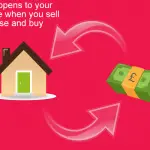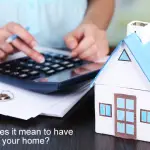
Selling a house in negative equity can be a challenge
A question often asked is ‘how can I get out of negative equity in my home?’ So what happens if you have negative equity in your home when you come to sell?
What happens if you have negative equity? Negative equity is used to describe your financial situation where the amount owed on your mortgage is greater than the current value of your home. Which means if you sell your house when you’re in negative equity the amount you’d receive for your property wouldn’t be enough to clear what you owe to your lender.
What is negative equity?
Before I go into what happens if you have negative equity in your house, it’s important to make sure you know the meaning of negative equity.
But what is equity?
To understand negative equity, it’s important to understand equity first.
If you have equity in your home; this is the value of your property, less any money that you owe on a mortgage that is secured against it. For example, if your home is worth £250,000 and your mortgage balance is £180,000, your equity would be £70,000.
Negative equity explained
Negative equity means that the market value of your home has fallen below the outstanding amount of your mortgage that’s secured on it. This scenario is usually caused by falling property prices.
For example, if you had bought your home for say £150,000 using a mortgage of £120,000. But now your property’s market value has fallen to £110,000, you would be in negative equity to the tune of £10,000.
Another example of how negative equity happens is where a mortgage company has lent more than the home is worth at the outset. There were mortgages available that were 125% of the market value of the house.
In the above example, where you’re buying a home worth £150,000, the loan in this case would be £187,500. That means that as soon as you move into the property in this example, you are already in negative equity. In this example, the negative equity would be £37,500.
What happens if you have negative equity?

Supposing you find out from the above calculation that you are in negative equity. What happens and what are you able to do about your situation.
If you intend to carry on living in your house, i.e. you don’t intend to sell it, then negative equity isn’t usually a problem. But it does become a problem when you come to sell your house. Which is probably why you are reading this article.
Negative equity solutions – getting out of the trap
If you’re asking yourself the question ‘Can I sell my house if I am in negative equity?’. If you feel trapped and not able to move, the following are solutions for you to consider.
Negative equity solution #1 – increase the value of your home
As described about in explaining the negative equity meaning, the amount of negativity is affected by two numbers. The amount of your negative equity depends on how much your house is worth and how much you owe to the mortgage lender.
That means, the more you increase your house value the lower the negative equity becomes.
Sometimes to increase the value of your home, you don’t actually need to spend too much money on it. Many times this can be as simple as tidying and cleaning the house. Clearing away clutter and making sure each room is clearly defined.
For example, if you are currently using one of your bedrooms for storage or as an office, this may affect the value. By turning this room back into a bedroom will affect your home’s valuation.
You may also have to spend some money on updating your home. This is especially true if the decoration is looking a bit tired.
Negative equity solution #2 – Use savings to pay down your mortgage
If you have savings, these can be used to pay down a part of the mortgage. This can either be done now, which if you do so will reduce the interest you pay on your mortgage. Alternatively, you can use your savings to make up the difference between what your house is worth sells for vs what is needed to pay off your mortgage.
The problems comes where the shortfall between what you sell you home for vs what is outstanding on your mortgage is greater than your savings. This is what is referred to as the negative equity trap.
Negative equity solution #3 – Over pay your mortgage
If you discover that you are in negative equity, another solution to the problem is to begin over paying your mortgage.
What this means is that in addition to your usual money direct debit mortgage payment, you can set up a standing order to pay off an additional amount. This will have the affect of reducing the negative equity gap.
The problem may be that you may struggle to afford mortgage over payments. If this is your problem, take a serious look at your monthly expenditure. What could you either cut down on or cut out altogether.
For example, how often do you go out or eat takeaway meals? These are expensive and it’s always cheaper to eat at home with food you’ve prepared yourself. Reduce your monthly expenditure and use this spare money to over pay your mortgage.
This negative equity solution assumes you have time to reduce your negative equity problem. But if you’ve discovered your negative equity problem when you’re about to sell your home, this solution will not work.
Negative equity solution #4 taking out another loan
In order to cover the equity shortfall, you could take a out a further loan. The risk of doing this is that you have an extra payment to make on top of your mortgage. Additionally, the interest rate on the loan may be expensive as it is not a secured loan.
This negative equity solution is also dependent on your credit rating too. In order to borrow at reasonable lending rates, you need to have a fair to good credit rating.
Negative equity solution #5 – Remain in your home
One solution to your negative equity problem may be to stay where you are and not sell your home. This may be frustrating and make you feel trapped, but you may not have any alternative than to do this. Whilst you remain in your home, the housing market may pick up, and the value of your house may improve so that you’re no longer in a negative equity situation.
Negative equity solution #6
Become a land lord and rent out your property. This negative equity solution isn’t for everyone, as not everyone wants to become a landlord.
This is especially true of late, as the present government is hitting landlords and developers hard.
What with the extra 3% stamp duty, the abolition of interest rate relief on mortgage interest and the proposed changes to the removal of bad tenants is also changing. I don’t understand the governments stance on landlords and why they are doing it, but irrespective of this, it is happening.
But this is a solution to your negative equity problem if you must move for whatever the reason may be.
At least if the rent covers your mortgage payments, you should then be able to afford the rent in your new home that you move to, or it should allow you to purchase another place, assuming you have enough of a deposit saved.
Negative equity solution #7 – Discuss your problem with us
If you don’t like the idea of becoming a landlord. Also, if you are not able to use any of the suggested options or negative equity solutions discussed above, you may be able to seek help from us.
If you get stuck, please feel free to make contact and we’d be more than happy to have an informal chat over a coffee. There’s no obligation and no hard sell.
We are here to help, and if we can we will.
We have creative methods that we can discuss with you to help you out of your negative equity trap.
How do you find out if you are in negative equity?
Discovering whether your home is in negative equity is a relatively straight forward process, as follows:
Calculating the market value of your house option #1
Your first option would be to have a quick check on Zoopla to see what houses in your street are worth, including your own. To use Zoopla, go to the ‘House Prices‘ section of their website and type in your street address and postcode.
However, this method is not fool proof, as the values on Zoopla can be either over valued or undervalued. But this is a reasonable guide valuation. It’s a starting point.
You can also go on net house prices.net too, as this will give you the most recent sales of houses in your postcode or street address.
When looking at this, always look for the most recent sale, as this will be a better guide for the current market. But also make sure you’re comparing the price of a similar house to your own.
These are both free options to work out the value of your house.
Calculating the market value of your house option #2
The second option and perhaps more reliable option would be to ask at least two local estate agents around to value your home.
This is also a free valuation option.
Calculating the market value of your house option #3
You may decide to instruct a RICS surveyor to value your house, which may or may not give you a better valuation for your home. However, a surveyor will be using similar information and market indicators as the free estate agent valuation.
Finding out how much you owe on your mortgage
Once you have the valuation of your home, you then need to obtain the outstanding balance on your mortgage. You may already know this of have the latest mortgage statement.
But if you don’t, it will be easy enough to call you mortgage lender for an up-to-date of how much you owe.
Calculating whether you have negative equity
Once you have the amount you owe your mortgage lender , together with the value of your home, deduct the amount of your outstanding mortgage from the valuation and this will give you the answer.
If your mortgage amount is higher than the valuation, then you are in negative equity. Whereas if your valuation is greater than what you owe on your mortgage, then you have equity in your home.
But always remember, if the amount outstanding on your mortgage is close to what your home is worth, this could cause you problems at the time you come to sell your property also.
This is because when you sell a property there are always selling fees. Firstly, you’ll have to pay estate agent fees and secondly, you will have legal conveyancing fees too.
Normally these will be deducted from the equity when you sell your house, but if there’s not sufficient equity in your home, you will need to find these fees yourself.
I hope you’ve enjoyed this article on what happens if you have negative equity
If you’ve enjoyed this article on what happens if you have negative equity please share it on your favourite social media site.
Also, if you have any questions, please feel free to comment below too. Alternatively, if you need more help, please feel free to contact us on our contact us page here.




